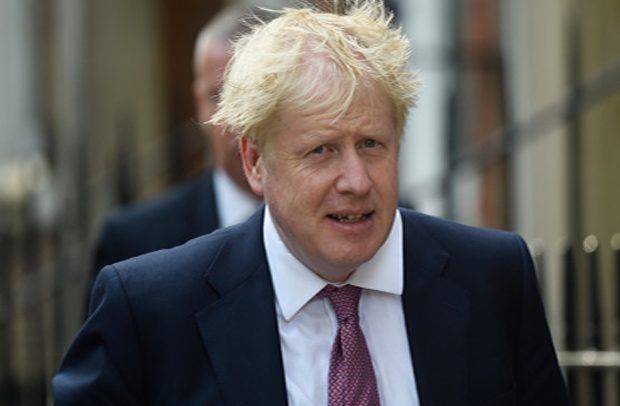Why Was Boris Johnson’s Ottoman Great-Grandfather Murdered?

On April 10, Turkey’s President Recep Tayyip Erdogan sent a letter to Boris Johnson, prime minister of the United Kingdom, informing him that Turkey “would like to welcome you in our country, which is your ancestral land.”
It is true that the Ottoman Empire, Turkey’s predecessor, is where Johnson’s paternal great-grandfather, Ali Kemal, was born. It is also where he was brutally murdered by Turkish nationalists in 1922 for wanting to bring to account the perpetrators of the 1915 Armenian genocide, and for criticizing the nationalist movement that would establish the Turkish Republic in 1923.
However, Turkey is denying the history behind the persecution and lynching of Kemal — just like it still denies the genocide itself.
Ali Kemal was a leading Ottoman journalist, editor, poet, novelist, and politician who served for some three months as the Minister of Education and then as the Minister of the Interior of the Ottoman Empire in 1919.
Because of his dissident writings and political speeches, Kemal had a hard life. He was a severe critic of the Committee of Union and Progress (CUP), also known as the Young Turks, which was the political party in power in the Ottoman Empire, and which made the decision to exterminate the Armenians in 1915. Kemal also publicly denounced the subsequent Turkish nationalist movement for its massacres against Christians.
As arrests and bans on his writings were an inevitable part of his life in the Ottoman Empire, Kemal lived in exile in Europe, Syria, and Egypt for much of his adult life. In 1909, he fled to Britain, where his first wife, a British woman named Winifred Brun, gave birth to their son, Osman Kemal Wilfred Johnson. Boris Johnson, born in 1964, is Wilfred’s grandson.
Kemal then returned to Turkey in 1912 and became a member of the Freedom and Accord Party, also known as the Liberal Union, which advocated for government decentralization, constitutionalism, and the rights of ethnic minorities.
When Ottoman Turkey was defeated in the first World War and the CUP party leaders fled the country, Kemal briefly became a cabinet minister of the Ottoman administration in 1919, and relentlessly demanded prosecution of the CUP leaders responsible for the massacres against Christians.
“He fiercely criticized the ruling party for entering the war, and for committing ‘war crimes and massacres’ against its own Armenian citizens,” according to author Raffi Bedrosyan.
As a staunch liberal and an Anglophile, Kemal regarded Britain as a model for democratic reform and industrial growth. He joined the Anglophile Society and advocated British protectorate status for Turkey. But Kemal then found himself in danger again, ultimately lynched and “torn apart limb by limb while still alive,” as Bedrosyan explains.
“Ali Kemal was vilified by Turkish nationalists at the time for his condemnations of the Armenian massacres,” said Professor Armen T. Marsoobian, the First Vice President of the International Association of Genocide Scholars. “In some quarters of Turkey, calling someone an Armenian is the equivalent of a curse.”
Meanwhile, the Turkish government has been ignoring or even distorting the true history of Johnson’s “Ottoman Turkish roots.”
Reuters reported on July 24, 2019: “Turkey celebrated incoming British prime minister Boris Johnson’s Turkish heritage on Wednesday, with politicians and media proclaiming that the ‘Ottoman grandson’ could strengthen ties between two countries on Europe’s fringes.”
Professor Marsoobian notes the “obvious contradictions in celebrating Boris Johnson’s Turkish roots in a figure such as Ali Kemal, while at the same time the official narrative of the Turkish independence war celebrates his killer, Nureddin Ibrahim Pasha, the general who orchestrated his killing.”
“National historical narratives, such as those of the founding of the Turkish Republic, do not acknowledge contradictions. Taking pride in Boris Johnson’s Turkish ancestry is a case in point,” Marsoobian added. “Yes, he was related to an important Ottoman figure, but let’s not dig too deeply into who that figure was and what he stood for. Let’s especially not mention that Ali Kemal was ordered killed by a national hero such as Nureddin Ibrahim. Ali Kemal, an Anglophile, hated at the time for having worked with the British, and whose great-grandson is Prime Minister of the UK, is now ironically celebrated as a figure linking the two countries.”
Genocide scholars today affirm Kemal. The International Association of Genocide Scholars announced in 2007 that “the Ottoman campaign against Christian minorities of the Empire between 1914 and 1923 constituted a genocide against Armenians, Assyrians, and Pontian and Anatolian Greeks.”
And Garo Paylan, an Armenian member of the Turkish Parliament, wrote on Twitter on July 24, 2019: “Ali Kemal was a conscientious politician. He wanted to bring to account [the perpetrators of] a major crime like the Armenian Genocide. … [Instead] the crime remained unpunished. It was then repeated. It is still being repeated. May Ali Kemal rest in peace.”
Uzay Bulut is a journalist and political analyst from Turkey and a fellow with the news and public policy group the Haym Salomon Center.









